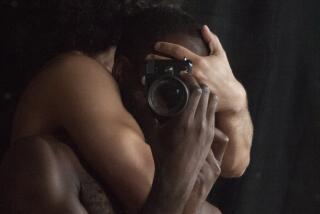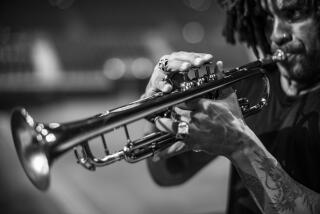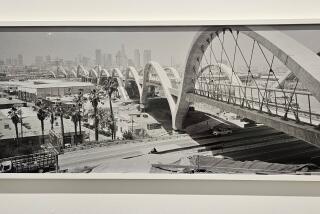Leibovitz Upset Over Yanking of Lennon Photo : Art: The photographer who shot the picture says the Fullerton cultural center action is ‘a sign of something very bad that’s happening in this country.’
- Share via
“Disgraceful.”
Photographer Annie Leibovitz was reacting to a decision by officials of the Muckenthaler Cultural Center in Fullerton to yank her portrait of a nude John Lennon and his fully clothed wife, Yoko Ono, from an exhibit there.
The decision is to be reviewed today when the city-owned center’s trustees meet with their programming committee. Objections from some of the trustees triggered the action late last week.
But meanwhile, in a sharply worded statement released Wednesday through her studio in New York, Leibovitz referred to the removal of the portrait as “a sign of something very bad that’s happening in this country. The cultural atmosphere is becoming more and more conformist and cowardly.”
Liebovitz elaborated Wednesday afternoon by telephone, saying she was “taken aback” by the Muckenthaler’s action. “I thought it was really grotesque,” she added. “I really thought this was the kind of fight John Lennon would have loved. It’s a good fight.”
Leibovitz’s well-known photograph--which appeared on newsstands around the world nearly 10 years ago, on the cover of Rolling Stone magazine--was to have been part of an exhibit entitled “Heroes, Heroines, Idols and Icons.” Some trustees who previewed the exhibit before it opened Saturday said the Lennon photo did not fit in with what they saw as a “positive show on heroism.”
Wes Morgan, Fullerton’s community services superintendent, maintained that the decision had “nothing to do with censorship, nudity, John Lennon or Yoko Ono.”
Liebovitz said such reasoning is nonetheless “preposterous” and asserted that the same kind of argument was used “for implementing government censorship in the Soviet Union in the Stalin era. It has a name: the Doctrine of the Positive Hero. Music and art were condemned because the function of the art did not show the positive hero.”
The photo was taken Dec. 8, 1980--just hours before Lennon was shot to death outside his New York City apartment. It shows him in a fetal position, embracing a reclining Ono. His buttocks are visible in profile. The photograph raised some controversy when it ran on the cover of the Jan. 22, 1981, edition of Rolling Stone, and several Southern California supermarket chains refused to carry it.
In the magazine, Leibovitz wrote: “I promised John that this would be the cover. I shot some test Polaroids first. . . . John said, ‘You’ve captured our relationship exactly.’ ”
“This is a photograph that shows affection and tenderness,” Leibovitz said in the statement released Wednesday. “It’s a good picture. It’s a picture that tells the truth. It should be in the show.”
“When I was asked to pick a couple of photographs (for the exhibit), it was the first one I thought of,” Leibovitz added by phone. “The photograph shows (that) he was never afraid to show how human he was.”
More to Read
The biggest entertainment stories
Get our big stories about Hollywood, film, television, music, arts, culture and more right in your inbox as soon as they publish.
You may occasionally receive promotional content from the Los Angeles Times.










